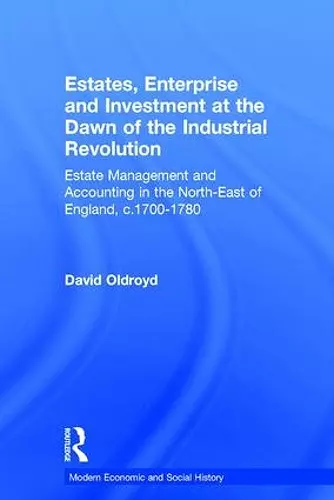Estates, Enterprise and Investment at the Dawn of the Industrial Revolution
Estate Management and Accounting in the North-East of England, c.1700-1780
Format:Hardback
Publisher:Taylor & Francis Ltd
Published:28th Oct '07
Currently unavailable, and unfortunately no date known when it will be back
This hardback is available in another edition too:
- Paperback£56.99(9781138264298)

At the beginning of the eighteenth century the landed estate represented the largest and most clearly defined type of business organisation in existence in pre-industrial England. Given the need for capital, wayleave rights and a ready supply of coal, iron and other raw materials it is unsurprising that most historians tend to place Britain's formative industrial development on such estates where all these elements were available. Yet despite this consensus, relatively little attention has been paid to the management and accountancy practices of these estates, which have the potential to reveal much about the development of the industrial revolution. In this study the management practice on estates in the north-east of England (c.1700-1780) is examined through the lens of the accounts and supporting documentation. Accounts encompassed every aspect of estate operations from the housekeeper's groceries to the lead and coal mines, and thus provide direct evidence of the underlying management systems over a diverse range of activities. The information flows on estates serve as an excellent medium for testing hypotheses concerning the management of estates and the attitudes of their owners and stewards. Focusing on the surviving accounts of three leading gentry families, Bowes, Ridley and Cotesworth, who came from contrasting social backgrounds, two main issues are addressed. The first concerns the productivity of estates. Were estates managed efficiently as productive investments, and more specifically, to what extent can the landowners and their stewards legitimately be described as capitalists? The second, related, question asks in what ways did accounting aid managerial activity at this early stage of industrial development? These are the central questions this book addresses through examination of the nature and function of accounts within the organisation. By looking in detail at records from this crucial region during the period of transition to an industrial
'Historians and social scientists of all hues should read this book as it shatters the beliefs cherished by many about the immaturity of business and accounting until the late-19th or even 20th centuries. It deserves to become a notable milestone in the history of accounting and capitalism, both for its erudition and its findings, but, perhaps more importantly, for the effect it should have in stimulating the further debate and research that we need to understand and learn from our industrial past.' Rob Bryer, University of Warwick, UK 'David Oldroyd's aim is to "enhance our understanding of the development of modern industrial society by observing it at the margin". The borderline time-scale is 1700-80; the site studied is the first part of Britain to industrialise on a significant scale - the north-east of England. His monograph explores the role of accounting in the transition from a mercantile to an industrial society, with interaction between the full range of business participants a key feature of his story. A powerful characteristic of Oldroyd's work is the skilful use of high-quality archival sources, with his discoveries interpreted through a critical lens that draws upon Marxist and Foucauldian theories relating to labour process and labour control. This scholarly text, written in a lively and engaging style, will prove a key reference work for those wishing to understand the role of estate management and accounting in the emergence of an industrialised Britain.' John Richard Edwards, Cardiff Business School, UK ’It is to the author's credit as well that he has produced a valuable and interesting book.’ EH-Net ’Oldroyd offers a fascinating insight into the accounting and management practices of three estates in the north-east of England. ...Consequently, Estates, Enterprise and Investment provides a valuable contribution to the debate about the progress of capitalism during the eighteenth century.’ Agricultural History Review ’The insights
ISBN: 9780754634553
Dimensions: unknown
Weight: 453g
234 pages